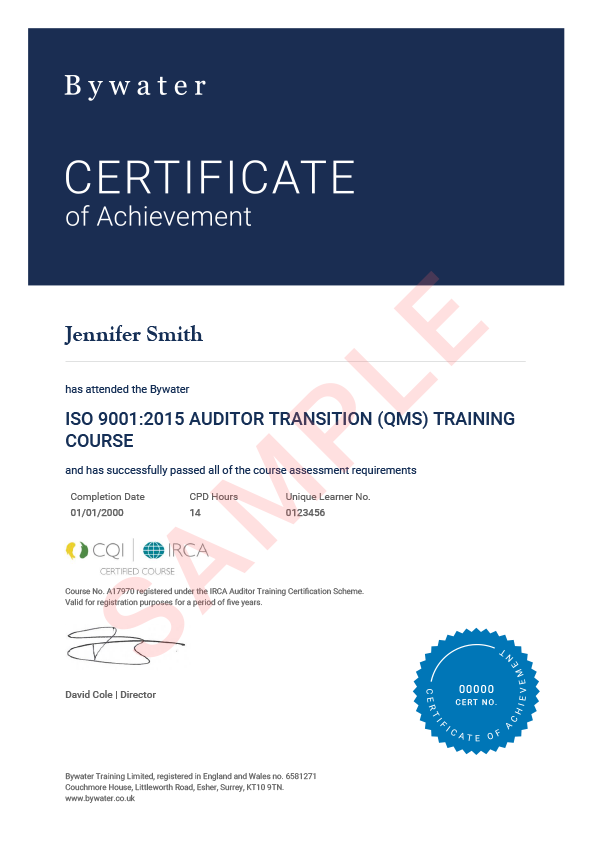ISO 9001:2015 Transition Auditor Training Course
DURATION
2 daysCPD
Equivalent to 14 hoursCERTIFICATES
All delegates will receive a certificate on completion.DELIVERY OPTIONS
Course certification

Discover how the requirements of ISO 9001:2015 differ from the previous version of the quality management standard ISO 9001:2008.
This 2-day CQI and IRCA certified ISO 9001:2015 Auditor Transition training course explores the standard in terms of structure, terminology and interpretation. Gaining this knowledge will enable auditors and other stakeholders to:
- understand how the emphasis of ISO 9001 has changed
- identify any change in approach necessary to competently conduct an audit against ISO 9001:2015
- implement any changes required and communicate to the organisation the implications of those changes
- meet the IRCA upgrade requirements for registered auditors
The interactive course builds on a practical case study through the 2 days to reinforce learning, and provides opportunity for discussion with peers and the tutor.
Click to read our ISO 9001 Transition Auditor course flyer.
- existing internal and external auditors who need to audit against ISO 9001:2015
- those involved in the internal audit programme who will be responsible for implementing the changes
- quality managers, management system practitioners and/or process owners
- qualified auditors needing to upgrade their auditor status to the new standard
CQI and IRCA recommend that delegates attending this course have an in-depth knowledge of ISO 9001:2008.
Senior managers and policy makers who would like to have an understanding of ISO 9001:2015 may care to look at our ISO 9001 Executive Briefing.
- differences between ISO 9001:2008 and ISO 9001:2015 – structure, terminology and interpretation
- Annex SL, the new structure for management system standards, in terms of:
- context of the organisation, scope and objectives
- leadership
- planning
- managing risk
- support
- the audit life cycle – an auditor’s approach to assessing the changes
- involvement of top management
- implications for organisations
- timeline for the transition from ISO 9001:2008 to ISO 9001:2015
- Day 1
- Welcome and introductions
- Module 1 Background to the changes in ISO 9001
- Module 2 Context of the organisation
- Workshop 1 Case study – reviewing a business manual
- Module 3 Scope of the management system
- Module 4 Quality management system and its processes
- Module 5 Leadership
- Module 6 Risks and opportunities
- Workshop 2 Case study – risks and opportunities
- LUNCH
- Module 7 Support
- Module 8 Operation
- Workshop 3 Audit situations
- Module 9 Performance evaluation
- Module 10 Improvement
- Short exam and review
- CLOSE
- Day 2
- Module 11 Audit process overview
- Workshop 4 Audit planning – what has changed?
- Module 12 Checklists
- Workshop 5 Case study – preparation of checklists
- LUNCH
- Workshop 6 Case study – audit
- Module 13 Nonconformity
- Workshop 7 Evaluation evidence for conformity and nonconformity
- Course review and evaluation
- CLOSE
- assess the differences between ISO 9001:2008 and ISO 9001:2015
- communicate to others what needs to change to meet the new requirements of the standard
- plan and prepare for revisions to existing management systems and implement the necessary changes
- plan, conduct and lead an audit based on the new requirements of ISO 9001:2015
Registered auditors will also be able to upgrade their IRCA status.

In-company training availability
Receive this course exclusively for your organisation, either in-person at your chosen venue or online in our user-friendly Virtual Classroom.
Enjoy cost-effective flexibility and personalised learning with tailored messaging designed to address your unique business challenges.
| In-Person | |
|---|---|
| Delegate numbers | Up to 12 |
| Total fees | TBC |
| Virtual Classroom | |
|---|---|
| Delegate numbers | Up to 10 |
| Total fees | TBC |
What's included
- Delegate certificates of attendance.
- Comprehensive course materials and handouts.
- All tutor expenses and courier fees.
- Free cancellation up to 13 working days before commencement.
For courses held outside the UK or requiring significant adjustments, we will clearly inform you of any additional fees before you book.
Next steps
Find out our availability and enquire about this course by completing the form and our training team will get in touch with you.
Alternatively contact us on 0333 123 9001 or email contact@bywater.co.uk to discuss your requirements.
Enquire
Complete the following form to enquire about this course and our training team will be in touch.
If you are an internal or external auditor working to the requirements of ISO 9001:2008, then this course will update your knowledge and skills to the latest version of the standard – ISO 9001:2015. It will also be of value to anyone, including senior managers, for whom it would be useful to understand the changes needed to upgrade their QMS.
The course will enable you to understand the differences between the versions of the standard in terms of structure, terminology and approach, and plan necessary changes in your organisation.
Up-to-date knowledge of ISO 9001 and quality management systems will benefit your organisation, and enable you to meet the IRCA upgrade requirements for registered auditors.
Yes. CQI and IRCA, the professional body that has certified this course, requires that you have an in-depth understanding of ISO 9001:2008 if you wish to attend this transition to ISO 9001:2015 training course.
If you do not have this knowledge, but want to become a lead or internal auditor of quality management systems against ISO 9001, we recommend you take a look at our other ISO 9001 training courses that can teach you the appropriate skill sets.
Yes, this Bywater course is CQI and IRCA certified, and you will receive a certificate after training to demonstrate you have achieved new professional skills and standing in line with the requirements of this internationally recognised body.
If you are already a lead auditor, then our certified Auditor Conversion training courses are designed to help you expand your knowledge and skills to audit an additional management system. These include:
- ISO 45001 Occupation Health & Safety Management System (OH&SMS) Auditor Conversion course
- ISO 14001 Environmental Management System (EMS) Auditor Conversion course
- ISO 27001 Information Security Management System (ISMS) Auditor Conversion course
The courses will give you the knowledge and skills to undertake 1st, 2nd and 3rd party audits against your chosen management system standard.
As an Approved Training Partner of CQI and IRCA we can offer you training that has been certified by the global body for professional QMS auditors.
We run a full range of scheduled courses both in venues across the UK and in our Virtual Classroom, allowing you the flexibility to choose a training date and place to suit your needs. For organisations with several employees to train, we also offer dedicated training courses.
It is our aim to help you successfully achieve a demonstrably high level of understanding. We do that by employing highly experienced, knowledgeable and engaging tutors to work with you through the training programme.
We are constantly improving our courses based on the feedback we invite from delegates. With over 40 years of experience in training provision, we continue to enjoy high levels of customer satisfaction.
No. ISO 9001:2008 certification is no longer valid. The transition period to move from ISO 9001:2008 to ISO 9001:2015 ended in September 2018. If your organisation wishes to be compliant with the current standard and be able to advertise itself as compliant, it will need to apply for ISO 9001:2015 certification.
Customer reviews
Magnetic Shields Limited|10th Jul, 2025
Network Rail|8th Jul, 2025
Portsmouth City Council|27th Jun, 2025
Portsmouth City Council|26th Jun, 2025
Links Training|25th Jun, 2025
Babcock Integrated Technology Limited|23rd Jun, 2025
Simpson Associates|20th Jun, 2025
GSK|18th Jun, 2025
DVSA (Driver & Vehicle Standards Agency)|12th Jun, 2025
Songa Shipmanagement Ltd|4th Jun, 2025
J Reddington Ltd|2nd Jun, 2025
Hybrid Solutions Group|29th May, 2025


